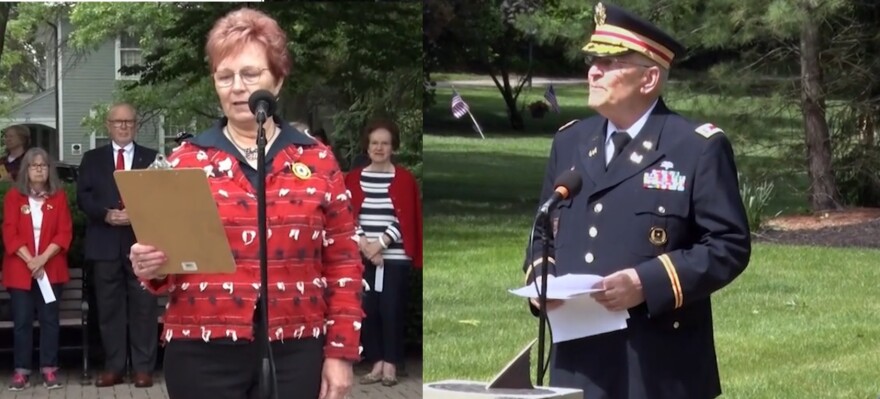Hudson has long been considered a desirable place to live, an affluent suburb with great schools. It has a history as a hub for abolitionists who fought slavery and provided passage to freedom through the Underground Railroad. Over the past few months, Hudson has once again become the center of national conversations about race, slavery, and equity.

When his mic was cut at Hudson’s Memorial Day ceremony retired Lieutenant Colonel Barney Kemter was unable to properly share what he’d learned about formerly enslaved Black Americans and the original Memorial Day. It was the latest in a series of incidents that has led to questions about racism in the community, particularly in the schools where there have been several instances of racially charged bullying over the past two years.
“My daughter has experienced some incidents on the bus, in the classroom where she’s been called some names, racially charged,” Parent Chante Jones said. She is Black and has two school-age children, is on the cultural proficiency advisory committee made up of students, staff, parents and community members and tasked with advancing a Diversity, Equity, and Inclusion, or DEI, Initiative the district approved last year, something many districts began to examine after the May 2020 murder of George Floyd in Minneapolis.
Jones say it’s not just about race. “It’s everything from LGBTQ+ to bullying to disabilities.”
The committee’s website states its goal is to “support and assist the district in becoming culturally proficient and anti-racist.” Jones thinks the initiative has the potential to stop students from bullying kids who don’t look or act like them.
“And I think the earlier we can educate them and expose them to other diverse populations and cultures; I think that they’re less likely to do that.”

But parents who’ve spoken out at school board meetings—like Robyn Meeker who spoke at a meeting in May--disagree.
“My child doesn’t see race, at all. He has been friends with many different children with different skin colors, and he never noticed it. But once you start putting a spotlight on one particular thing, they’re now noticing, ‘Maybe that child is different than me. Maybe my peer is different. What’s the difference, oh it’s skin color.”
That notion of being colorblind is part of the problem, according to Sherif Mansour, a parent and Egyptian immigrant who is also a member of the cultural proficiency committee. He says students need to see and acknowledge diversity.
“I think it will help them in their interpersonal relationships, I think it will make them perhaps more compassionate.”

The advisory committee is just getting started, and nothing has been implemented in the schools. But there is fear from some in the community about something called critical race theory or CRT—a concept that has been used to fuel conservative concerns. Here’s community member Bill Klausman at another May school board meeting:
“CRT in my opinion, represents the biggest threat since the Civil War to the rule of law and maintenance of a civil society in America ... What needs to be totally and forever dismantled from this school system is critical race theory for it is the very definition of racism.”
CRT is not commonly used in K-12 education and is not part of Hudson’s curriculum. Elizabeth Smith-Pryor, a professor of African American history at Kent State, says CRT has become part of a conservative culture war, but it started as a scholarly exploration of Civil Rights legislation enacted in the 1960s.
“We’ve passed these new laws, but yet, there’s still a lot of race-based inequality. Why might that be? And they began to think about more broadly than say Civil Rights law, what’s the connection between race and the American legal system?”
CRT has become a charged topic not only in school board meetings but in state legislatures including the Ohio House. State Rep Don Jones of Freeport, has introduced legislation to ban schools from teaching CRT. And two northeast Ohio legislators, Sarah Fowler Arthur and Diane Grendell, have introduced another bill banning the teaching of any divisive concepts. We were unable to connect with any of them for an interview. But State Representative Casey Weinstein of Hudson opposes these bills that he says shortchange students.
“I think our students are capable of handling tough subjects, of talking about difficult subjects, of being made to feel uncomfortable sometimes.”
As for Hudson’s DEI initiative, the district is sticking with it, although multiple attempts to interview coordinator Nyree Wilkerson were unsuccessful. During the last two board meetings parents and community members expressed support for the initiative. Sherif Mansour is encouraged by the conversations and hopes the community keeps talking.
“I am glad that Hudson is growing more diverse. I’m glad that Hudson is not burying its head in the sand regarding these issues and by in large is being willing to speak about them, act about them, and learn about them.”






